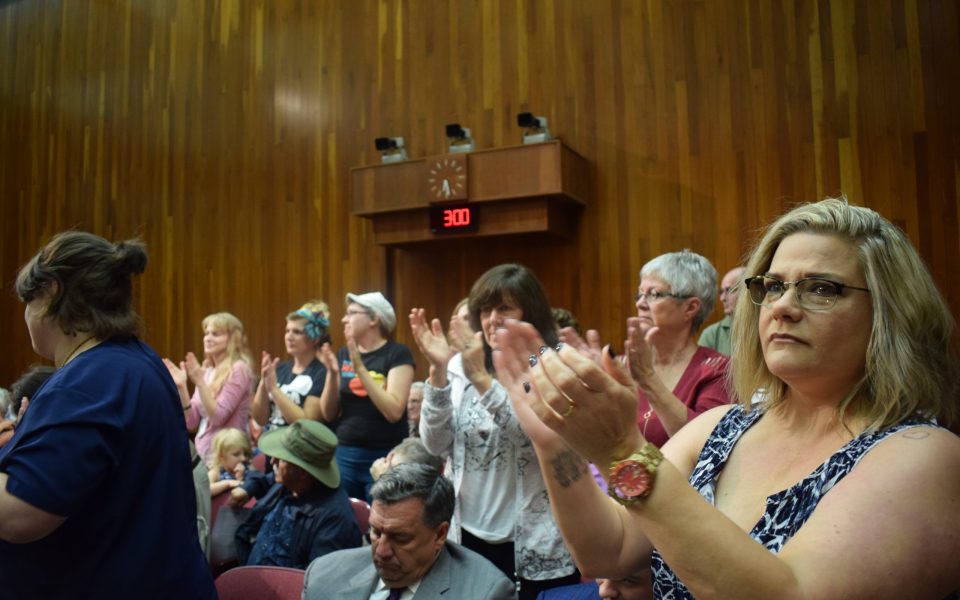Greensboro City Council apologized in a 7-1 vote on Tuesday for the city’s role in the 1979 Greensboro Massacre at the urging of several speakers. The unexpected vote came three days after the murder of an anti-racist counter-protester at a white supremacist rally in Charlottesville, Va.
“Instead of saying Charlottesville might or could happen in Greensboro, we need to say that it did happen here,” speaker Marcia Fouteh said.
Councilwoman Sharon Hightower made the motion, which was seconded by Councilwoman Yvonne Johnson.
“I think we don’t need to read all that to know that one of the things they’re looking for is an apology from city council,” Hightower said, eliciting applause from the majority of attendees.
Councilman Tony Wilkins heatedly accused Hightower of political grandstanding and voted against the motion, saying he would review the Greensboro Truth and Reconciliation Report and change his vote if he decided it would be appropriate.
Councilman Justin Outling maintained silence throughout the discussion and Councilman Mike Barber was absent.
Hightower reminded Wilkins that she made the same motion a year ago, adding, “This is not new.”[pullquote]Learn more about the Truth and Reconciliation Commission and read the report at greensborotrc.org.[/pullquote]
Councilwoman Goldie Wells echoed Hightower’s sentiments.
“We’ve had the same people come in here for years,” she added. “Why is it that we cannot be the ones that make a change and stop it?… We are not responsible for the rest of the world but [to] the people [who] voted us in to stand for what is right for the city of Greensboro.”
In 1979, Klansmen and Nazis drove an armed caravan into an anti-Klan rally and shot five protesters to death. The Truth and Reconciliation Commission researched the incident and released its findings in 2006. A civil jury found the city and some Klansmen liable for the killings but as recently as June 2009, city council declined to apologize and voted to issue a statement of regret instead.
April Parker, a leader of the Black Lives Matter Gate City Chapter, argued in favor of the apology.
“[The city of Greensboro] makes a lot of money off of protesters and the legacy of protest but then we kill the truth-tellers,” Parker said, pointing out an ironic history of reactive rather than progressive actions by council members in a city known for the Woolworth’s sit-ins.
As the public comment period came to a close, Parker read aloud 14 recommendations from the Truth and Reconciliation Report, continuing past the point Vaughan signaled for the podium mic to be cut when Parker went over the time limit.
Council members plan to review the commission’s report and consider a more formal apology in the future, but it is unclear what steps city government might take toward addressing the report’s findings and how actively council members will solicit further community input for solutions.
Parker suggested the issue is far from resolved.
“The apologies have just started,” she said.
Join the First Amendment Society, a membership that goes directly to funding TCB‘s newsroom.
We believe that reporting can save the world.
The TCB First Amendment Society recognizes the vital role of a free, unfettered press with a bundling of local experiences designed to build community, and unique engagements with our newsroom that will help you understand, and shape, local journalism’s critical role in uplifting the people in our cities.
All revenue goes directly into the newsroom as reporters’ salaries and freelance commissions.


Leave a Reply